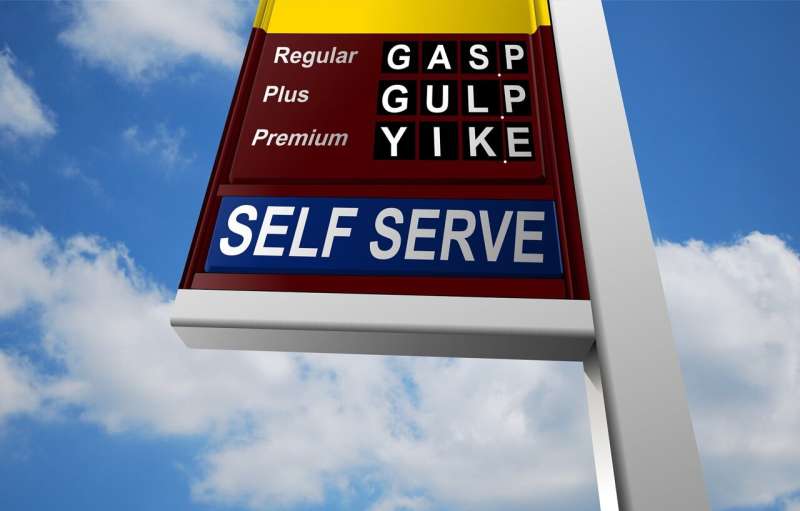Why aren't we using the global gas crisis to go green?

President Joe Biden is releasing 1 million barrels daily from U.S. oil reserves in hope of staving off gasoline inflation. Germany and other European nations continue to buy natural gas and oil from Russia, effectively undermining the pain of war sanctions.
The stresses surrounding the global petroleum market should be hastening governments to lessen their dependence on fossil fuels, says Jennie C. Stephens, Dean's Professor of Sustainability Science and Policy at Northeastern. And yet the world seems to be doubling-down on oil and gas in the short term in defiance of a disturbing report issued by the United Nations climate science panel Monday.
Greenhouse gas emissions must peak before 2025 to avoid the worst outcomes of climate change, according to the Intergovernmental Panel on Climate Change (IPCC).
"It's now or never," said IPCC co-Chair Jim Skea. "Without immediate and deep emissions reductions across all sectors, it will be impossible."
Stephens says the conclusions are obvious.
"The IPCC report says that the most important thing we need to do—and we've known this for decades—is to end fossil-fuel reliance," says Stephens, who directs the School of Public Policy and Urban Affairs as well as Strategic Research Collaborations at the Global Resilience Institute. "The only reason we haven't is because of what many of us call the 'polluter elite': The people who have power and privilege, who have been profiting off of fossil fuels, are keeping us hooked on fossil fuels."
On the same day that the IPCC was issuing its report, ExxonMobil disclosed a $2.3 billion gain in profit based on the recent rise in oil prices. (The company added that it will lose $4 billion from its ongoing exit from Russia.)
Prices may rise further if more countries refuse to buy Russian gas, per a policy announced by Lithuania on Sunday. The shortages should inspire governments to pursue green solutions, says Stephens.
"Any disruption creates an opportunity for change to incentivize the transformation that is needed," she says.
One starting point would be to end U.S. government subsidies for coal, oil, and natural gas, says Stephens. The subsidies totaled $5.9 trillion in 2020, according to the International Monetary Fund.
"We have all the technologies that are needed," Stephens says. "It's not a sacrifice. It's about reinvestment and putting money in the right places."
She notes that an array of options are available to help wean communities off fossil fuels.
"We should be investing in any and all transportation options that reduce our reliance on fossil fuels," says Stephens, author of "Diversifying Power: Why We Need Antiracist, Feminist Leadership on Climate and Energy."
"All public transit should be free, so that people don't have to drive as much," she continues. "We should be accelerating incentives for all kinds of renewable energy at all levels and scales, from individual households, to every building and parking lot. There should be solar and wind, and we should be investing in geothermal energy (to exploit heat within the earth).
"The technologies are all there. It's about political will and a shift in thinking about how we pay for things."
At Northeastern, the Faculty Senate's climate justice committee has offered a number of proposals, Stephens says.
"One of our big recommendations is that Northeastern and every organization—every individual, every household, every country—has to reckon with their fossil-fuel reliance and should be trying to wean themselves from that reliance," Stephens says. "We connected it with what's happening in the Ukraine, and the tragedy of our reliance, and Europe's reliance, on fossil fuels from Russia. Fossil fuels are a huge part of our geopolitical instability right now."
Public psychology plays a major role in these issues, says Nada Sanders, distinguished professor of supply-chain management at Northeastern. Residual anger from the COVID-19 pandemic and global supply chain shortages are adding to the pressure felt by government leaders to respond to the gas crisis, Sanders says.
"There has been a general sense of impatience since COVID, perhaps more than ever before," Sanders says. "And that makes it very difficult for whoever is in power to say to citizens, "Now is a time to be patient." I think people have exhausted every little bit of patience that they have.
"At the same time, we have the oil and gas companies that are saying, "Now is the time to start opening up, we've got to start drilling." And it's really unfortunate."
Stephens believes it's not too late for priorities to veer away from fossil fuels.
"The IPCC report says we need radical change," Stephens says. "So you can't just shift small things here and there; we're talking about big shifts. And the only reason that we're not doing it is because of political resistance from powerful interests that don't want it to happen."
Provided by Northeastern University





















